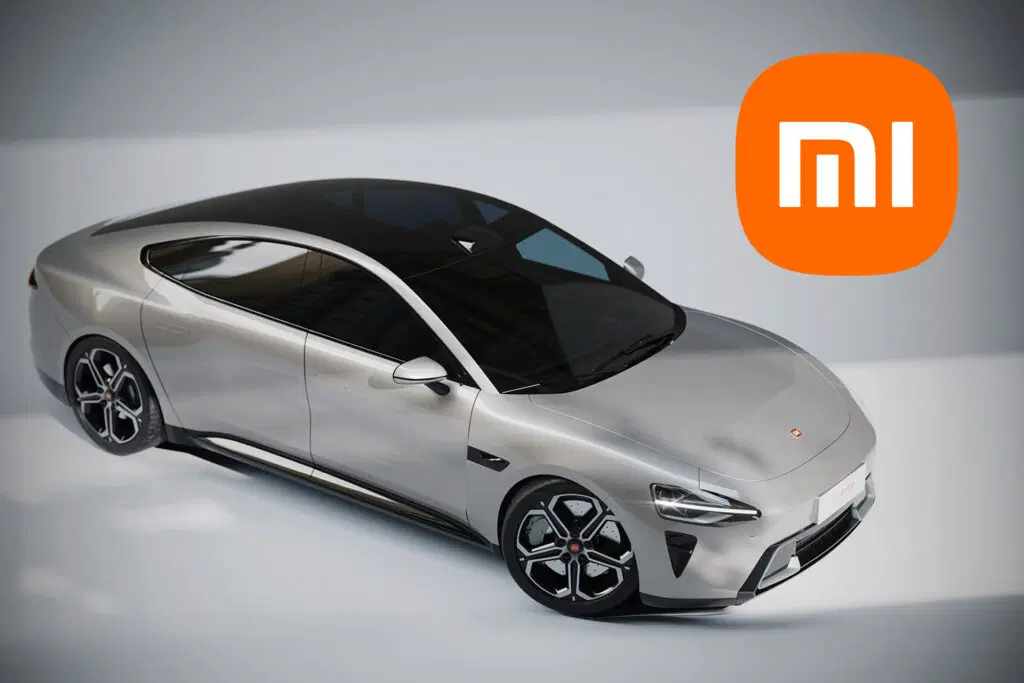Introduction – The EV Scene in India
Electric cars are known for their efficiency and eco-friendliness as they produce zero tailpipe emissions. In India, the popularity of electric cars is on the rise, with several models available in the market from various manufacturers. The electric vehicle (EV) scene in India has evolved significantly, moving beyond its nascent stage.
The steady growth in charging infrastructure, coupled with the increasing affordability and accessibility of EVs, has led to a surge in acceptance among car buyers. The rising fuel prices and the green credentials associated with electric mobility have further fueled this shift towards EVs. However, ‘range anxiety’ continues to be a deterrent for many potential buyers.
The Challenge of Range Anxiety
Despite the growing popularity of EVs, range anxiety continues to deter many potential buyers. This refers to the fear that an electric vehicle has insufficient range to reach its destination and would thus strand the vehicle’s occupants.
Factors Affecting the Range of Electric Cars
Several factors can affect the range of an electric car. The size and efficiency of the battery are the most significant factors. Larger, more efficient batteries can store more energy, allowing the car to travel further on a single charge. Driving conditions also play a role. For example, driving at high speeds, uphill, or in cold weather can reduce the range. Finally, the use of in-car features like air conditioning and heating can also impact the range as these features consume energy.
Top 10 Electric Cars with the Highest Range in India – The Longest-Range EVs
There are quite a few EVs in India now that provide sufficient range on a single charge, enough even for highway runs. This blog will compile a list of 10 electric cars and SUVs that boast the longest claimed range on a single charge. The list focuses on the premium end of the EV range in India, with vehicles tested based on the stringent WLTP cycle and not the more relaxed ARAI testing cycle.
People Also Read: 10 Most Expensive Electric Hypercars In The World
10. Mercedes-Benz EQB – Electric Car with Range of 423km in Single Charge
The Mercedes-Benz EQB, based on the GLB SUV, offers a range of up to 423km on the WLTP cycle. It is the only three-row EV that you can currently buy in India, making it a practical buy for a large family. The EQB comes to India in the 350 guise, which, equipped with a 66.5kWh battery pack, offers a range of up to 423km on the WLTP cycle. The Mercedes-Benz EQB takes approximately 7 hours and 30 minutes to charge from 0-100% using a 7.4 kW home charger. The time to charge from 0-80% is approximately 6 hours.

9. BMW iX – Electric Car with Range of 425km in Single Charge
The BMW iX, the BMW Group’s first all-electric vehicle in India, offers a driving range of up to 425km on the WLTP cycle. It gets a dual electric motor set-up with one motor on each axle. Despite being an EV, the iX drives like a BMW should, and also gets the quirks of a born-EV platform. The BMW iX takes around 11 hours to charge from 0-100% using a 11 kW home charger. The time to charge from 0-80% is approximately 8.8 hours.

8. Jaguar i-Pace Electric Car with Range of 470km in Single Charge
The Jaguar i-Pace, Jaguar’s first EV, offers a WLTP range of 470km. It makes 400hp and 696Nm from its dual motors on each axle, drawing power from a 90kWh battery pack. The i-Pace is not the most spacious or luxurious even in its own segment, but it’s the driving experience that defines its character – it’s really a hoot to drive. The Jaguar i-Pace takes approximately 13 hours to charge from 0-100% using a 7 kW home charger. The time to charge from 0-80% is approximately 10.4 hours.

7. Hyundai Ioniq 5 Electric Car with Range of 481km in Single Charge
The Hyundai Ioniq 5, powered by a 72.6kWh battery, offers a WLTP range of 481km. It’s worth mentioning that it has even been tested by ARAI, where it has a claimed range of 631km. The Ioniq 5 is quirky and futuristic, has a fantastic road presence, and quite possibly, is the best Hyundai ever. The Hyundai Ioniq 5 takes around 6 hours and 43 minutes to charge from 0-100% using a 10.5 kW home charger. The time to charge from 0-80% is approximately 5 hours and 22 minutes.
Read Detail Specification Overview and Review of Hyundai IONIQ 5
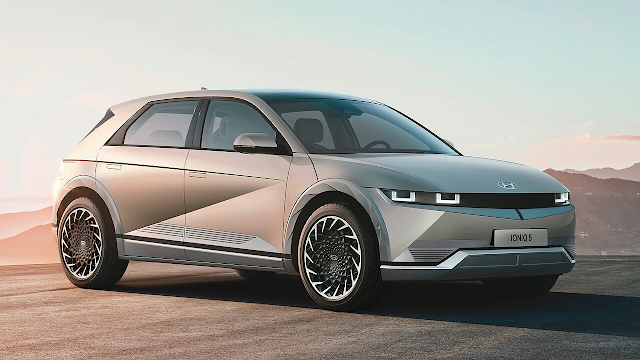
6. Audi e-tron Electric Car with Range of 484km in Single Charge
The Audi e-tron SUV have a maximum claimed range of 484km on the WLTP cycle. The e-tron comes in SUV and Sportback body styles, and in two variants: the 50, which gets two electric motors that produce a combined 313hp and 540Nm; and the 55, which also has a dual-motor layout with more power – 408hp and 664Nm. The Audi e-tron takes around 8.5 hours to charge from 0-100% using an 11 kW home charger. The time to charge from 0-80% is approximately 6.8 hours.

5. Audi e-tron GT – Electric Car with Range of 500km in Single Charge
The Audi e-tron GT, built on the same born-EV platform as the Taycan, offers a range of up to 500km for the standard e-tron GT and 481km for the RS e-tron GT, as per the WLTP cycle. The Audi e-tron GT’s stunning design, quick performance, and keen handling are some of its highlights. The Audi e-tron GT takes approximately 5 hours to charge from 0-100% using an 11 kW home charger. The time to charge from 0-80% is around 4 hours.

4. Kia EV6 – Electric Car with Range of 528km in Single Charge
Kia’s first electric model in India, the EV6, offers a maximum range of 528km on the WLTP cycle. It is available in a single-motor, rear-wheel-drive guise and in a dual-motor, all-wheel-drive guise. The EV6 is a premium crossover that looks like nothing else on the road, and is quite a performer too. The Kia EV6 takes approximately 6 hours to charge the standard range 2WD from 0-100%, and it takes as little as 18 minutes to charge from 10% to 80% with 800V ultra high-speed charging capability.
Read Detail Specification Overview and Review of KIA EV6
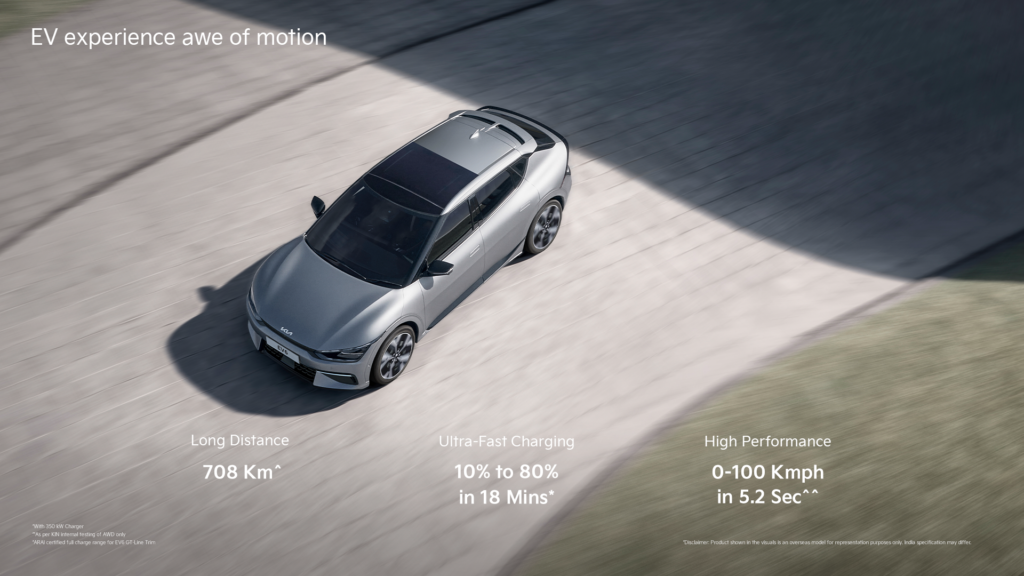
3. BMW i4 Electric Car with Range of 590km in Single Charge
The BMW i4, an all-electric derivative of the 4 Series Gran Coupe, offers a range of 590km on the WLTP cycle. It comes in eDrive40 guise with a rear-mounted motor driving the rear wheels. The i4 is in the same price band as the sporty M340i and larger 5 Series, offering a rewarding driving experience with a fantastic range. The BMW i4 takes around 8.5 hours to charge from 0-100% using an 11 kW home charger. The time to charge from 0-80% is approximately 6.8 hours.
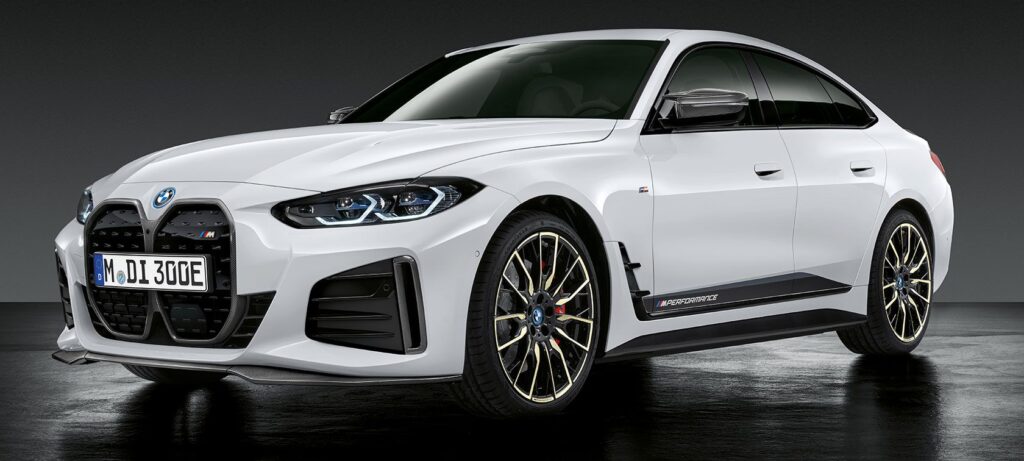
2. BMW i7 – Electric Car with Range of 625km in Single Charge
The BMW i7, an all-electric derivative of the 7 Series, offers a range of 625km on the WLTP cycle. It comes to India in an xDrive 60 variant that produces 544hp and 745Nm from its two electric motors, mounted on each axle. The i7 is a 7 Series regardless of the drivetrain, offering the same luxury and comfort as its ICE sibling. The BMW i7 takes approximately 11 hours to charge from 0-100% using an 11 kW home charger. The time to charge from 0-80% is around 8.8 hours.
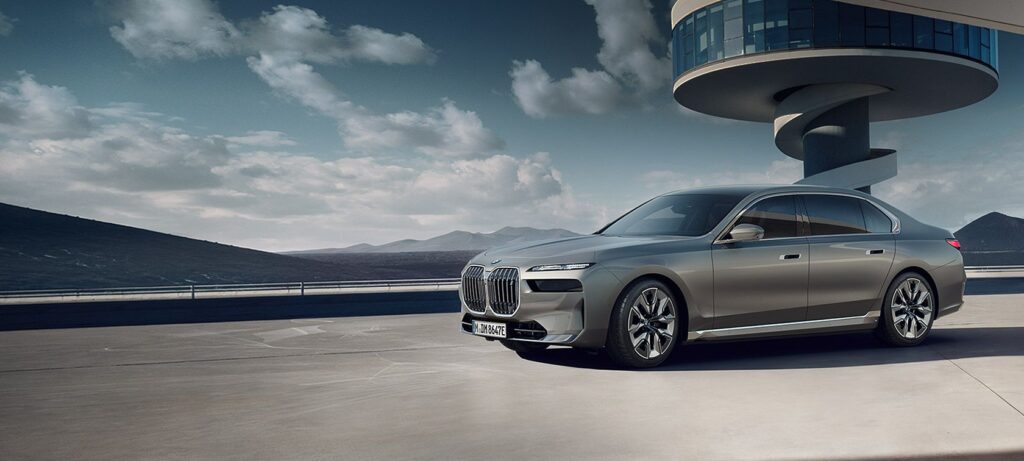
1. Mercedes-Benz EQS – Electric Car with Range of 677km in Single Charge
Topping the list is the Mercedes-Benz EQS. This electric alternative to the Mercedes S-Class is available in two variants in India – the imported, AMG-spec EQS 53, and the locally assembled, regular EQS 580. The EQS 580, powered by a 107.8kWh battery and a dual motor set-up, offers a WLTP range of 677km. The EQS 53, on the other hand, offers a WLTP range of 586km. The EQS 580 has an even higher ARAI-claimed range of a massive 857km. The EQS 53 is the most expensive EV on sale in India. The Mercedes-Benz EQS can be charged from 0 to 100% in 11.25 hours using a 240V Level 2 charger. Using a Level 3 DC Fast charger, the Mercedes-Benz EQS can reach a full charge in just over 30 minutes.

| Rank | Car Model | Range (WLTP) | Charging Time (0-100%) | Charging Time (0-80%) |
|---|---|---|---|---|
| 10 | Mercedes-Benz EQB | 423 km | 7 hours 30 minutes | 6 hours |
| 9 | BMW IX | 425 km | 11 hours | 8.8 hours |
| 8 | Jaguar I-Pace | 470 km | 13 hours | 10.4 hours |
| 7 | Hyundai Ioniq 5 | 481 km | 6 hours 43 minutes | 5 hours 22 minutes |
| 6 | Audi E-Tron | 484 km | 8.5 hours | 6.8 hours |
| 5 | Audi E-Tron GT | 500 km | 5 hours | 4 hours |
| 4 | Kia EV6 | 528 km | 6 hours (standard range 2WD) | 17 minutes (10% to 80%) |
| 3 | BMW I4 | 590 km | 8.5 hours | 6.8 hours |
| 2 | BMW I7 | 625 km | 11 hours | 8.8 hours |
| 1 | Mercedes-Benz EQS | 677 km | 11.25 hours (using a 240V Level 2 charger) | 31 minutes (Using a Level 3 DC Fast charger) |
Please note that the range of electric vehicles can vary based on driving conditions and usage patterns.
The electric vehicle market in India is growing rapidly, with a wide range of options available for consumers. From compact cars like the Tata Tiago EV to luxury sedans like the BMW i7, there is an electric car to suit every need and budget.
This, coupled with the increasing availability of charging infrastructure, makes electric cars a viable and sustainable choice for Indian consumers. As technology continues to evolve, we can expect to see even more advancements in EV range and performance in the coming years.
The Future of Electric Cars in India
The future of electric vehicles in India looks promising, with a surge in sales expected by the end of the decade. The government’s commitment to reducing carbon emissions has led to a significant increase in EV sales, with over a million units sold last year, a leap of over 300% from the previous year 1.
Several new EVs are set to hit the Indian market in 2023, including the Mahindra XUV 400 Electric, Hyundai Ioniq 5, and MG Air EV 2. These upcoming launches reflect the growing acceptance of EVs as a viable alternative to internal combustion engine cars.
The government’s role in promoting EVs cannot be overstated. The Indian EV industry attracted $6 billion in investment in 2021, and the market is expected to be a $206 billion opportunity by the end of this decade 1. This growth is fueled by both federal incentive programs and state-level policies, which have helped build the electric bus program for zero-emission urban commuting 1.
People Also Read: The Electric Vehicle Revolution: Should You Get an Electric Car in 2023-2024?
Conclusion
In conclusion, the range of electric cars is a critical factor for potential EV buyers in India. Various factors, including battery size and driving conditions, influence the range of an electric car. The top 10 electric cars with the highest range in India, as discussed in this blog, offer a glimpse into the exciting future of EVs in the country.
The government’s role in promoting EVs and the upcoming high-range electric cars indicate a bright future for the EV market in India. As technology advances and infrastructure develops, we can expect to see more high-range electric cars on Indian roads.
The transition to electric mobility is not just about adopting new technology; it’s about making a conscious choice for a sustainable and eco-friendly future. As more people embrace electric cars, we move one step closer to this goal.

